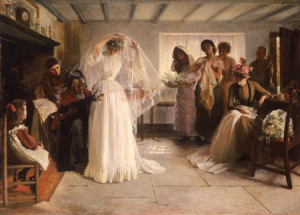The Irish Presbyterian Church continues to endure sustained criticism for deciding that individuals in same-sex relationships cannot become full-members:
In light of our understanding of Scripture and the Church’s understanding of a credible profession of faith, it is clear that same-sex couples are not eligible for communicant membership nor are they qualified to receive baptism for their children.
The church is following the guidance of the church’s doctrine committee, which had concluded:
The Presbyterian Church in Ireland has a clear position on marriage and human relationships based on the teaching of the Bible.
…The apostolic witness in the New Testament unambiguously regards homosexual activity as contrary to nature, understood as God’s created order, and that it sets forth a permanent principle of creation, not a culturally limited perception [Emphasis mine]
When the average evangelical Christian hears language which describes an act as “contrary to nature”, she is probably reminded of Paul in Romans One. I should hope that pastors are also immediately reminded of deep, venerable intellectual traditions which have inspired theologians for generations. But when a secular reader hears that her lifestyle is “contrary to nature”, she will believe that she has been called a pervert or a freak.
So a little clarity is in order. The church was not engaged in a bout of name-calling or hell fire and fury preaching. Rather, it was alluding to Paul’s argument in Romans chapter one. Paul does indeed call homosexual relationships unnatural, echoing the critiques of homosexual behaviour made by Jews living in the Roman Empire. Bisexual activity was relatively common in Graeco-Roman culture; it was accompanied by a shocking tolerance of male prostitution and pederasty.
Paul was relying on the same logic that Jesus used to critique divorce. Jesus, like Paul, relies on the teaching of Genesis. There, God establishes that to form a new family one man and one woman to join in a life long union. This union should be permanent and faithful; no one (including the partners) should attempt to break this union. Anything which falls outside this pattern is condemned as porneia – sexual sin.
Jewish moralists thought of homosexuality as an exclusively gentile vice (which it obviously wasn’t; the Torah’s prohibition would have been pointless otherwise!); so in Romans one, Paul is playing on his readers beliefs and prejudices. He agrees that homosexual activity is wrong; but, having won the agreement of his audience, he immediately goes on to denounce the moralist’s disapproval as hypocritical. The gentiles might be bad; but those who possess God’s law and fail to keep it are in an even worse position.
 In any case, by citing Paul, the Presbyterian church was simply restating what the majority of the world’s Christians (and Muslims, Sikhs and Jews) believe and have always believed: that God has a plan for us, that he designed the world accordingly and that we have an obligation to follow that plan. Our obligations govern how we should conduct our sexual relationships. Unlike Judaism’s dietary codes or the rules regarding sacrifices, these rules were laid down at creation, and were restated by the Son of God when he established his Kingdom. So they are binding on Christians until the end of time.
In any case, by citing Paul, the Presbyterian church was simply restating what the majority of the world’s Christians (and Muslims, Sikhs and Jews) believe and have always believed: that God has a plan for us, that he designed the world accordingly and that we have an obligation to follow that plan. Our obligations govern how we should conduct our sexual relationships. Unlike Judaism’s dietary codes or the rules regarding sacrifices, these rules were laid down at creation, and were restated by the Son of God when he established his Kingdom. So they are binding on Christians until the end of time.
These rules fit with what we know about the world (so much so that some argue we can infer those rules from our nature)[1]. A sexual relationship between a man and a woman is the only relationship that can lead to new life; that new life needs attention, care and love. So the human race needs men and women to form the right sort of sexual relationships. Before they unite in body and soul, they ought to love one another in the right way: the sort of love that commits, perseveres, and sacrifices. Their love should be expressed with public vows and promises: that is, in a wedding.
 Now, does this mean that sex is only for procreation? That misses the point by a some distance. Sex is a part of the gift of marriage. Marriage is a life-long bond between a man and a woman; this bond needs affection and passion to survive; and such bonds should be honoured and protected because they provide the right relationship for generating and raising new life. To be sure, some married couples are unable to have children through injury, illness, or simply because they met too late in life. But that does not make them any less married!
Now, does this mean that sex is only for procreation? That misses the point by a some distance. Sex is a part of the gift of marriage. Marriage is a life-long bond between a man and a woman; this bond needs affection and passion to survive; and such bonds should be honoured and protected because they provide the right relationship for generating and raising new life. To be sure, some married couples are unable to have children through injury, illness, or simply because they met too late in life. But that does not make them any less married!
 When a man and woman marry they have formed the sort of union appropriate for creating the next generation. Their partnership is good in and of itself; and their marriage tells a story and has an objective meaning which cannot be undermined by infertility. So why, then, do theologians keep saying things like the purpose of marriage “has to do with family, that has to do with procreation”?
When a man and woman marry they have formed the sort of union appropriate for creating the next generation. Their partnership is good in and of itself; and their marriage tells a story and has an objective meaning which cannot be undermined by infertility. So why, then, do theologians keep saying things like the purpose of marriage “has to do with family, that has to do with procreation”?
 Simply because there would be no point in marriages if there was no connection between sex and procreation. (Indeed, it seems to have escaped the secular world’s notice that sex and reproduction tend to go together!) We insist on life long bonds between sexual partners because sexual partnership is reliably correlated with procreation, and children need (and crave) stable, loving families. If children were not going to come along we would not need marriage; we could settle for domestic partnerships; living arrangements that can form and dissolve apart as the couple’s wish. Fidelity and permanency become a matter of taste and convenience.
Simply because there would be no point in marriages if there was no connection between sex and procreation. (Indeed, it seems to have escaped the secular world’s notice that sex and reproduction tend to go together!) We insist on life long bonds between sexual partners because sexual partnership is reliably correlated with procreation, and children need (and crave) stable, loving families. If children were not going to come along we would not need marriage; we could settle for domestic partnerships; living arrangements that can form and dissolve apart as the couple’s wish. Fidelity and permanency become a matter of taste and convenience.
So the church believes that monogamy was God’s plan for us from the beginning. (Of course, some plans are difficult to follow; they can be challenging and ask for enormous sacrifices. That does not make them any less reasonable. After all, Christians are called to take up a cross when they follow Jesus). I imagine that this is all the Presbyterian ministers were trying to say. I might wish they had expressed themselves in a clearer style; but, in substance, they have derived their view of marriage from Paul and Jesus. Should we expect Christian ministers to do anything else?
[1] I do not mean to imply that the Presbyterian Church is endorsing Natural Law ethics. Reformed theologians tend to be hostile to Natural Law theory. In my experience, this hostility can be surprisingly uninformed and profoundly unhelpful. Often simplified to the point of absurdity by the secular press and uber-Protestants, it is a rich tradition which contains many competing voices and arguments.

